- Home
- Harlan Ellison
The Harlan Ellison Hornbook / Harlan Ellison's Movie Page 2
The Harlan Ellison Hornbook / Harlan Ellison's Movie Read online
Page 2
Since these columns are better than fifteen years old, one might wonder if they can possibly be relevant to today’s experience. (In point of fact, there are things in here that, not to kick it bloody while it’s down, we couldn’t give a shit less about. Say, the dubious culinary qualities of long-defunct restaurants, the lineage of Harlan’s marabunta horde of housekeepers/assistants/secretaries, and Harlan’s aforementioned [and wholly incorrect] views on Christmas. But Harlan is a master showman, and whether writing about things as obscure and mind-numbing as the vocal stylings of Buddy Greco or the vagaries of microcephalic science fiction groupies, you will be entertained and pleased. As he says, he is not above tossing in a flying fish or a troll to make the story more interesting, and Harlan can sling fish faster than a Japanese trawler at Marineland. But back to relevance…) Read his column on the apathy of college students, and of how their only interest in him as a lecturer was in how much money he makes, and you will think he wrote it this morning after a run-in with a truckload of Harvard Business School yuppies. It was written in 1973. Courage, honor, responsibility, joy, love, friendship, pain, outrage, anger, trust—the things of being human—are always relevant.
Harlan Ellison is Jiminy Cricket to our Pinocchio. But did you know there were two talking crickets? Walt Disney based his cute, lovable creature Jiminy (as well as the rest of the movie) on a book, The Adventures of Pinocchio by Carlo Collodi. In the book, the talking cricket wasn’t named Jiminy and wasn’t cute and lovable. Collodi referred to it simply as the Talking Cricket. In the film, Jiminy spoke the truth as he saw it to Pinocchio and the two of them lived happily ever after. In the book, the Talking Cricket spoke the truth to Pinocchio, and Pinocchio smashed it to death with a hammer.
Spreading the truth is neither safe, nor easy.
Herein, there are lessons. Open your eyes and take advantage of them. Harlan the Fish Juggler will make you laugh and cry and snigger and giggle and probably pee in your pants. High entertainment is at hand. Harlan the Cricket offers larger opportunities.
You will be tested, from time to time throughout your life, and if you pay attention here your point score will be higher than it otherwise might be.
INTRODUCTION:
THE LOST SECRETS OF EAST ATLANTIS
BY HARLAN ELLISON
There are seismic temblor authorities who contend it all began with the tsunami that resulted from the sub-sea earthquake in the Taiwan Trench that inundated Japan and took Tokyo out of the international financial community permanently.
Whatever sequence of major upheavals proceeded from that disaster—referred to by survivors, to this day, as The Divine Hiccup—within four months the interlocking temblors had latticed the Earth’s crust, finally building up a pressure directly under the Tropic of Cancer at 23°302N 38°72152E—about one hundred kilometers due south of the port city of Yanbu’ in Saudi Arabia at the bottom of the Red Sea, Al-Bahr al-Ahmar.
When the mantle exploded, the fissure slithered north-northeast beneath the mountains of the Harrat al-‘Uwayrid where some unknown impediment forced the massive energy toward the surface, shattering the mountains, severing a gigantic chunk of the Madyan, leaping the Straits of Tīrān and Jūbāl, taking out the southern tip of the Sinai Peninsula, and racing across the Arabian Desert.
When the juggernaut reached the 27th Parallel approaching the 32nd Meridian, it just said t’hell with it, and blew out nine hundred kilometers of Egypt, reducing everything between Cairo and the Aswan Dam to a fine powdered ash that made for spectacular sunsets for decades to come.
And there, in the caldera that had been the Valley of the Kings, all supposition surrounding the myths of Atlantis came to an end as the lost continent thrust up its highest mountain. For thrice thirty thousand years The Spire of the Sun had lain hidden beneath the desert. A mountaintop sheathed in solid gold; at its apex, hewn from the basalt, the House of the Heavens; a temple whose underground levels fell dizzyingly for a mile inside the mountain; prayerhouse to deities so arcane and ancient that not even the sigh of their names had come to us through antiquity.
When the archaeological teams from Thule and Brasilia and Sydney landed their huge choppers in the sea-washed plazas of the House of the Heavens, and the scientists entered the three great triangular portals that swung open at the touch of a finger on center-pivots, they roamed far and deep, and they came, at last, to the central nidus of the Atlanteans. And it was there, on a golden tabulary, they found—perfectly preserved as if waiting for the light of the stars to fall upon its inscribed pages of thinnest beaten silver—the lost manuscript of The Harlan Ellison Hornbook.
No?
You’re not going for it?
Well, okay, so it isn’t eons, it’s only twenty years—give or take a cardiac arrest or two—since this book was put under contract. But it seems like eons, to hear Jack Chalker and Otto Penzler tell it. And tell of it they have, in Jack’s case for two decades, which could, I suppose, be considered reason enough for kvetching; but in Otto’s case it’s only been about three years, even though I promised to deliver the manuscript in thirty days.
So, okay, I admit it. I’m running a little late this century. But I’ve been sick.
The forty-six columns (and ancillary material) that constitute the raw, 484-page manuscript of the Hornbook have awaited assemblage between hardcovers more than fifteen times as long as it took to write them. With the exception of the final three columns—written for a long-defunct periodical called The Saint Louis Literary Supplement in 1976—all of this 120,000-word volume (including a complete, hitherto-unpublished motion picture screenplay) was written in one unbroken fourteen-month burst of journalistic activity.
Between the essays on television contained in my books THE GLASS TEAT (1970) and THE OTHER GLASS TEAT (1975), and the cultural ruminations that make up AN EDGE IN MY VOICE (1985), lie the essays of the Hornbook, written between 26 October 1972 and 13 December 1973.
I don’t need anyone to tell me that this “trove” of “lost writings” is not as important as, say, locating buried scrolls from the Great Library at Alexandria, pre’first burning. But in the twenty years since the Hornbook columns appeared in the pages of the Los Angeles Free Press and the L.A. Weekly News, some decent measure of literary celebrity has come my way; and if what has been published under my name has any lasting merit—one hopes, but it’s never anything better than a crapshoot—then this substantial chunk of prose is certainly (at least) another measure of ultimate worthiness. Posterity needs all the help it can get. Ask John Fante or Frederic Prokosch or Shirley Jackson. We all need a pat on the back, even unto the grave.
(Quentin Crisp has written: “Artists in any medium are nothing more than a bunch of hooligans who cannot live within their income of admiration.”)
Original column logo by Gahan Wilson
At least one full generation of readers has grown up since I wrote these wonky little essays on the passing parade. The concerns of those years near the end of the Vietnam war, near the end of the reign of Nixon, near the end of a period of heightened social consciousness, now seem like musty, if amusing, reminiscences of ex-Flower Power advocates bent on boring their yuppie-in-training offspring. Nonetheless, voices of yesterday speak in these pages and, for kids to whom nostalgia is breakfast, there may yet be a few bemusing stories to recount.
Had this book been published when it was first signed up, it would have spoken directly to the times. Twenty years after the fact it offers itself in a different language entirely. But whether in Urdu or Serbo-Croat or Cockney, the stuff that really counts never changes. Courage, friendship, integrity, passion, idiocy, and the variegated pratfalls of just folks translate easily.
From East Atlantis, the lost Hornbook is delivered from the House of the Heavens, situated conveniently near the new Atlantis Marriott, the Trump Trylon and Perisphere, the Taco Bell Shopping Mall and Driving Range, and the spectacular MGM-Sanyo HundredPlex Theater, straight to you.
Be kind. We’ve h
ad a long journey, and we’re sorry we kept you waiting.
HARLAN ELLISON
8 July 1989
WHEN I WAS A LITTLE BOY, THEY CALLED ME A LIAR, BUT NOW THAT I’M GROWN UP, THEY CALL ME A WRITER.
-ISAAC BASHEVIS SINGER
GOD GAVE US MEMORY THAT WE MIGHT HAVE ROSES IN DECEMBER.
-JAMES M. BARRIE
WRITING IS AN OCCUPATION IN WHICH YOU HAVE TO KEEP PROVING YOUR TALENT TO PEOPLE WHO HAVE NONE.
-JULES RENARDC1864–1910)
INSTALLMENT 1 | 26 OCTOBER 1972
EVERYTHING I KNOW ABOUT MY FATHER
As if emerging from a dark dream, it suddenly occurs to me that I’ve spent at least half my life looking for my Father.
No, don’t get it wrong: I’m not a bastard. I was born in University Hospital in Cleveland, Ohio, at 2:20 P.M. on 27 May 1934, to Louis Laverne Ellison and Serita Rosenthal Ellison…so I know who my Father was. And right here on my birth certificate, which I’m looking at, it asks in a little box: Legitimate? (Which is about as chill shot a way of asking it as I’ve ever seen.) But, happily for my Mother and unhappily for my biographers, it says right back, and snappishly: yes.
So when I say I’ve spent half my adult life looking for my old man, I don’t mean it like something out of Victor Hugo. (Though it now occurs in the wake of the first realization—and how strange that one awakening of curiosity firecrackers into other awarenesses, seriatim—that I’ve written a number of stories in which kids are looking for their fathers, for one reason or another, to suit the plot. The one that pops to mind foremost was called “No Fourth Commandment,” and it was about a kid who was looking for his father, whom he’d never known, to kill him for fucking-over his mother. Sold the story after its magazine publication to Route 66, where it was adapted into a teleplay by a guy named Larry Marcus, and was retitled “A Gift for a Warrior.” It aired on January 18th, 1963, almost a year to the day I arrived in Los Angeles from Back East, and years later Marcus and the producer of Route 66, Herbert Leonard, did it as the basis of their film Going Home, without paying me for its second adaptation, but that’s another story and my attorney is in the process of talking to them about it, so let’s get back to the point.)
My father, Louis Laverne Ellison
My Father died in 1949, when I was fifteen. And I’d lived with him and my Mother, off and on, for those fifteen years, but I never really knew him, or even much about him. It wasn’t till my Mother was very ill, three or four years ago, and she thought it was all over, that she spilled some very heavy data about Louis Laverne.
There’s a lot of it she won’t be happy if I relate. It is silly, of course, it’s all forty and more years gone, but family skeletons rattle loudest in the minds of those who live in memories, which is where my Mother’s at. Today is nowhere nearly as important as all the yesterdays with my Father. So I won’t go into the circumstances of how my Father practiced dentistry in Cleveland for eleven years. That’s a story for another time, years from now.
For openers, like me, my Father was a short man. Even shorter than I, as I recall. I’m 5252, for the record. He was incredibly gentle: I remember once, when I’d done something outstandingly shitty as a child, he was compelled to take me into the cellar and use the “strap” on me. His belt. Now perceive, please, that there is no faintest scintilla of hatred in this recollection. He was not a brutal man, and about as given to corporal punishment as Albert Schweitzer. But it was a time in this country when such things were expected of a father. “You just wait till your father comes home!” was the maternal cry, and one feared with only half a fear, because I knew my Dad just couldn’t do such things.
But, as I say, on one occasion the punishment fit the crime—perhaps it was the time I shoved Johnny Mummy off the garage roof while we were playing Batman and Robin—and my Dad took me down into the cellar at 89 Harmon Drive in Painesville, Ohio, and he walloped me good.
I got over the stinging in about an hour, though there was a dull, remembered pain for weeks thereafter.
My Father became ill. He went upstairs into his bedroom and he cried. He wasn’t himself for several weeks after. Of course, I knew none of that at the time.
He was gentle, and he looked like, well, the closest way I can describe him was that he resembled a short Brian Donlevy. If you’re not hip to who Brian Donlevy is, check out the Late Late Show.
When he was a little boy, my Father worked on riverboats, as a candy butcher. From that job he got into working minstrel shows. He sang. Really fine voice, even in later years. In fact, he had his photo on the sheet music of “My Yiddishe Momma,” a song Al Jolson made famous; the song was written by a friend of Dad’s, who dedicated it to my Father’s mother…whom I never met. Never met my paternal grandfather, either.
Dad wanted to be a dentist, and he wound up practicing in Cleveland. Around Prohibition time. He was such a sensational dentist, I’m told, that the mob used to come to him for their mouthwork. My Mother worked as his receptionist after they’d been married a while, and she tells me when the gangsters came to get drilled and filled, my Dad insisted they check their heat with Mom. There were times, she says, when her desk drawer was difficult to pull open, so filled with guns was it.
Anyhow, you may wonder why I’m talking about all this here, the initial offering of a new column. Well, I wanted to talk about something important for openers, and almost all of this I never knew until a few days ago when my Mother came to visit from Florida. I don’t see much of her, and we’ve never really talked to each other; but she got onto the subject of my Father, as she usually does, and I started prying the real truth out of her about him. Not the bullshit they feed kids about their parents, but who he really was. In all of the things I’ve ever written, I’ve said virtually nothing about my Father, you see, and that’s because I simply didn’t know the man. We were in the same house, but we were strangers. It was as though we vibrated on different planes of existence, passing each other and passing through each other, like shadows.
But when my Mother got around to telling me my Father had done time in prison, in some strange and perverted way I started to realize I’d been searching for “Doc” Ellison almost all my life.
Because of the stuff I’m not allowed to tell, he had to give up the D.D.S. practice. It was Prohibition time, it was Depression time, and my Dad had to support my Mother and my sister and me. So he got into the selling of booze.
Most of this is unclear because my single source of information, my Mother, chooses to blur it all. But as best I can tell, my Dad had friends in Canada, and he would make auto runs up through Buffalo into Toronto to pick up the hootch. Then he’d drive it back down to Cincinnati and Cleveland and thereabouts. After a while, things got easier, and my Dad gave work to a guy he met, a guy who was as down on his luck as Dad had been. And one night, on a run, the guy got busted while transporting the alcohol. So my Dad took the rap, and let the other guy get off. As my Mom tells it, the driver had a family and, well…
My Dad was a gentle man.
So he went to the can. Fairly stiff sentence, from what I can gather, but he didn’t do it all. (And years later, when I wound up in jail, I was always amazed at how facilitously and soberly my Mother took it, and how competent she was at bailing my ass out of the slammer. Now I understand.)
After that, my Dad went to work for my uncles in Painesville, in their jewelry store. I was a little kid at the time, and knew none of what had gone down.
Years went by, and my Dad thought he owned a piece of the store—Hughes Jewelry on the corner of State & Main in Painesville. I was too busy fighting for my life to pay much attention, and I was always running away, but then in 1947, after my Uncle Morrie had come back from the War, it turned out my Father didn’t own anything. He had been the manager of the store, had built up the clientele and won friends all through town—he was the only Jew ever taken into the Moose lodge in Painesville, a town famed for its anti-Semitism—but when the crunch came down, my old man
was out on his ass. But it had been my Mother’s brothers, you see, and so there wasn’t much he could do about it. Jewish families hang tight that way. So at close to the age of fifty, my Father had to open his own store.
He couldn’t get ground-floor space on Main Street, so he took an upstairs suite, and sold from there. In his off-hours he sold appliances by personal contact. It was a grueling existence. The fucking climb up those stairs alone was murder. That staircase went almost straight up, and he had to make that climb twenty times a day.
Well, it killed him a year later.
May 1st, 1949, a Sunday, I came downstairs from my room, to see my Dad sitting in his big overstuffed chair by the fireplace, the Sunday edition of the Cleveland Plain Dealer around his feet, his pipe in his mouth. I was still on the stairs, about to ask him for the funnies when suddenly he began to choke.
I watched, helpless and with a kind of detached fascination as he died right before my eyes. Coronary thrombosis. It was all over in seconds. My Mother was mostly stunned, but somehow we managed to get him onto the sofa; the pulmotor squad arrived too late. They couldn’t have done anything. He was gone the minute he started to choke.
All through the next days, I moved like some kind of somnambulist. I was into baseball in those days, and I had a fuzz-less tennis ball that I bounced against the house. For the next month all I did, from morning till night, was stand outside on the front lawn under the maple tree, and bounce that ball off the wall, and catch it in the trapper’s mitt my Dad had bought me. I threw the ball and caught it, threw it and caught it, over and over and over…

 Repent, Harlequin! Said the Ticktockman
Repent, Harlequin! Said the Ticktockman Broken Glass
Broken Glass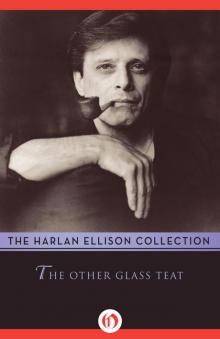 Other Glass Teat
Other Glass Teat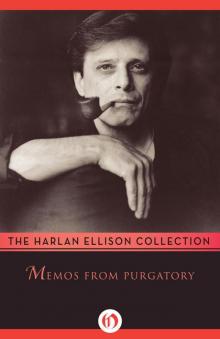 Memos From Purgatory
Memos From Purgatory I Have No Mouth and I Must Scream
I Have No Mouth and I Must Scream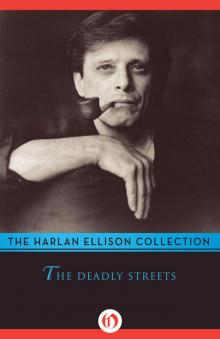 The Deadly Streets
The Deadly Streets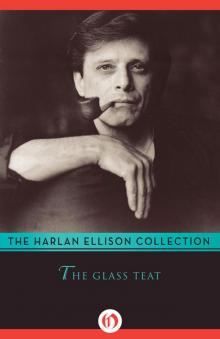 The Glass Teat
The Glass Teat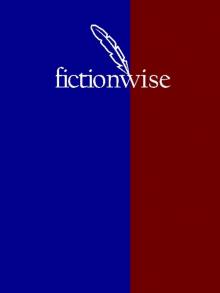 Paingod and Other Delusions
Paingod and Other Delusions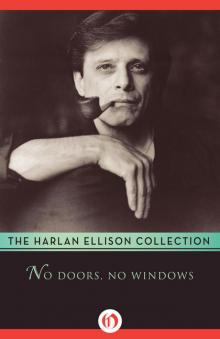 No Doors No Windows
No Doors No Windows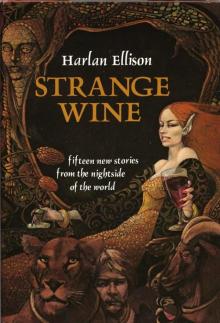 Strange Wine
Strange Wine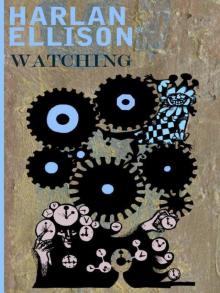 Harlan Ellison's Watching
Harlan Ellison's Watching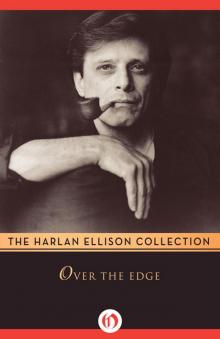 Over the Edge/An Edge in My Voice
Over the Edge/An Edge in My Voice Troublemakers: Stories by Harlan Ellison
Troublemakers: Stories by Harlan Ellison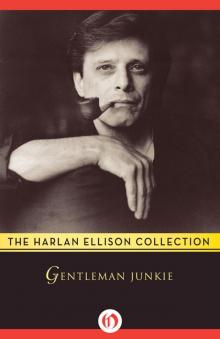 Gentleman Junkie and Other Stories of the Hung-Up Generation
Gentleman Junkie and Other Stories of the Hung-Up Generation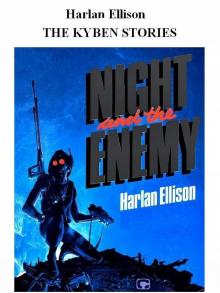 The Kyben Stories
The Kyben Stories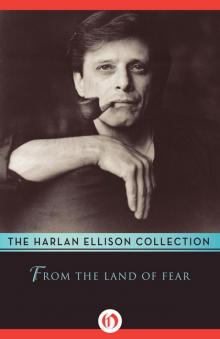 From the Land of Fear
From the Land of Fear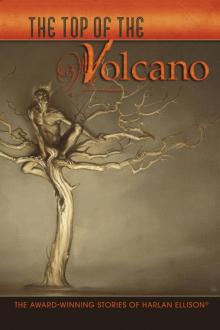 The Top of the Volcano: The Award-Winning Stories of Harlan Ellison
The Top of the Volcano: The Award-Winning Stories of Harlan Ellison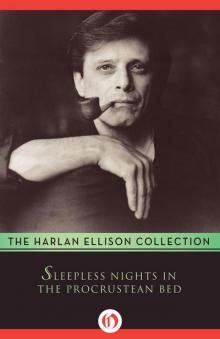 Sleepless Nights in the Procrustean Bed
Sleepless Nights in the Procrustean Bed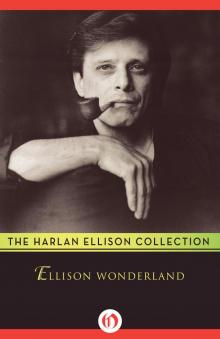 Ellison Wonderland
Ellison Wonderland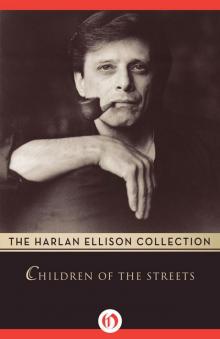 Children of the Streets
Children of the Streets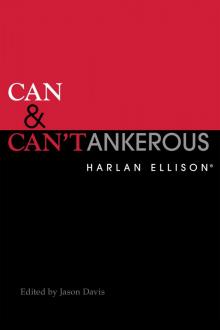 Can & Can'tankerous
Can & Can'tankerous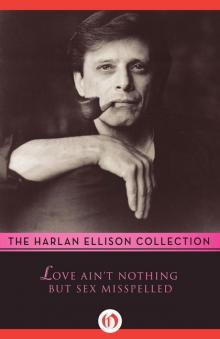 Love Ain't Nothing but Sex Misspelled
Love Ain't Nothing but Sex Misspelled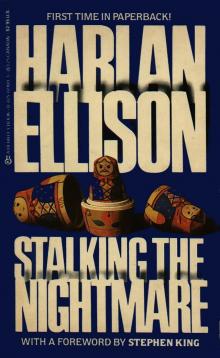 Stalking the Nightmare
Stalking the Nightmare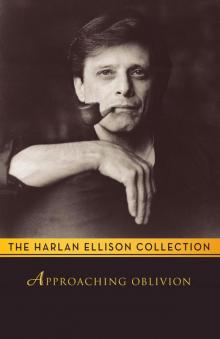 Approaching Oblivion
Approaching Oblivion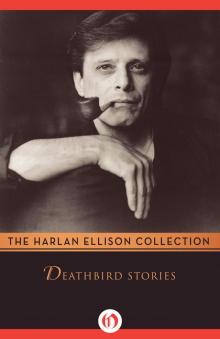 Deathbird Stories
Deathbird Stories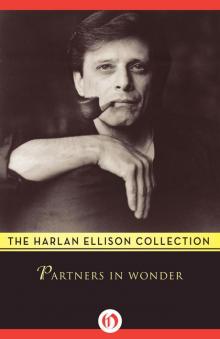 Partners in Wonder
Partners in Wonder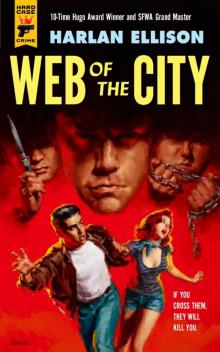 Web of the City
Web of the City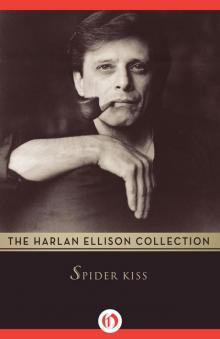 Spider Kiss
Spider Kiss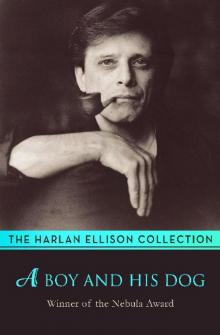 A Boy and His Dog
A Boy and His Dog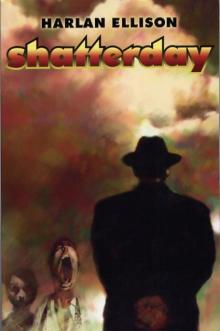 Shatterday
Shatterday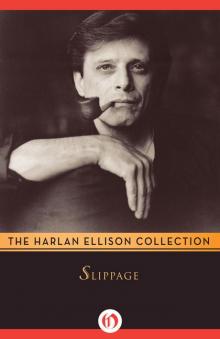 Slippage: Previously Uncollected, Precariously Poised Stories
Slippage: Previously Uncollected, Precariously Poised Stories Repent, Harlequin! Said the Ticktockman
Repent, Harlequin! Said the Ticktockman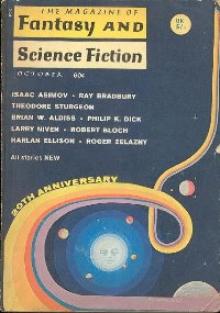 Come to Me Not in Winter's White
Come to Me Not in Winter's White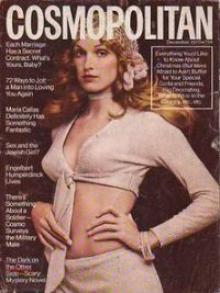 The Song the Zombie Sang
The Song the Zombie Sang The Other Glass Teat
The Other Glass Teat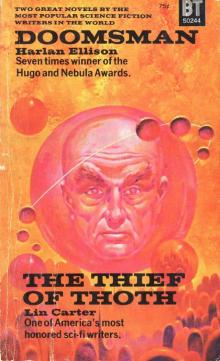 Doomsman - the Theif of Thoth
Doomsman - the Theif of Thoth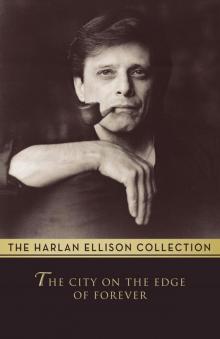 The City on the Edge of Forever
The City on the Edge of Forever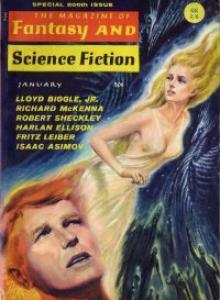 I See a Man Sitting on a Chair, and the Chair Is Biting His Leg
I See a Man Sitting on a Chair, and the Chair Is Biting His Leg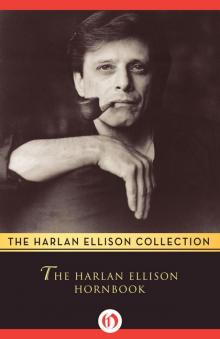 The Harlan Ellison Hornbook
The Harlan Ellison Hornbook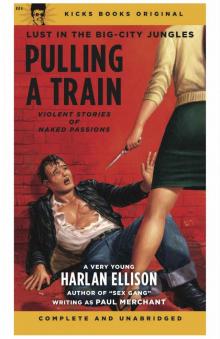 Pulling A Train
Pulling A Train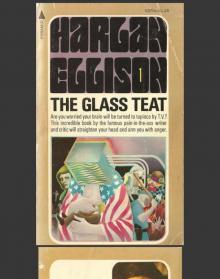 The Glass Teat - essays of opinion on the subject of television
The Glass Teat - essays of opinion on the subject of television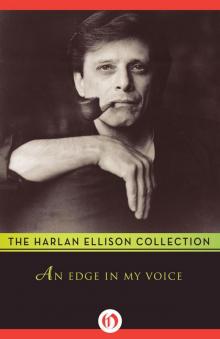 An Edge in My Voice
An Edge in My Voice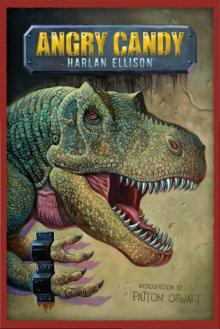 Angry Candy
Angry Candy Troublemakers
Troublemakers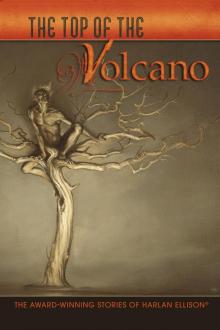 The Top of the Volcano
The Top of the Volcano Over the Edge
Over the Edge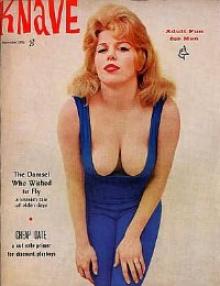 Survivor #1
Survivor #1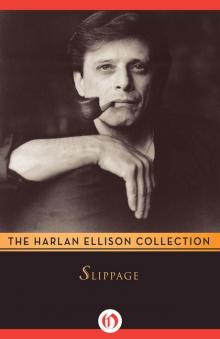 Slippage
Slippage